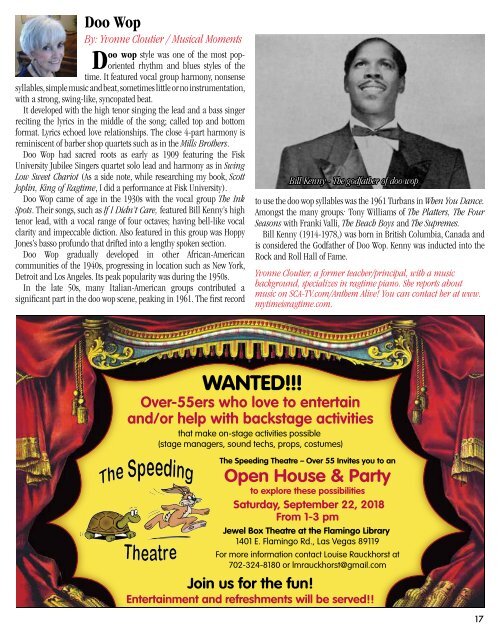You also want an ePaper? Increase the reach of your titles
YUMPU automatically turns print PDFs into web optimized ePapers that Google loves.
Doo Wop<br />
By: Yvonne Cloutier / Musical Moments<br />
Doo wop style was one of the most poporiented<br />
rhythm and blues styles of the<br />
time. It featured vocal group harmony, nonsense<br />
syllables, simple music and beat, sometimes little or no instrumentation,<br />
with a strong, swing-like, syncopated beat.<br />
It developed with the high tenor singing the lead and a bass singer<br />
reciting the lyrics in the middle of the song; called top and bottom<br />
format. Lyrics echoed love relationships. The close 4-part harmony is<br />
reminiscent of barber shop quartets such as in the Mills Brothers.<br />
Doo Wop had sacred roots as early as 1909 featuring the Fisk<br />
University Jubilee Singers quartet solo lead and harmony as in Swing<br />
Low Sweet Chariot (As a side note, while researching my book, Scott<br />
Joplin, King of Ragtime, I did a performance at Fisk University).<br />
Doo Wop came of age in the 1930s with the vocal group The Ink<br />
Spots. Their songs, such as If I Didn’t Care, featured Bill Kenny’s high<br />
tenor lead, with a vocal range of four octaves; having bell-like vocal<br />
clarity and impeccable diction. Also featured in this group was Hoppy<br />
Jones’s basso profundo that drifted into a lengthy spoken section.<br />
Doo Wop gradually developed in other African-American<br />
communities of the 1940s, progressing in location such as New York,<br />
Detroit and Los Angeles. Its peak popularity was during the 1950s.<br />
In the late 50s, many Italian-American groups contributed a<br />
significant part in the doo wop scene, peaking in 1961. The first record<br />
Bill Kenny - The godfather of doo wop<br />
to use the doo wop syllables was the 1961 Turbans in When You Dance.<br />
Amongst the many groups: Tony Williams of The Platters, The Four<br />
Seasons with Franki Valli, The Beach Boys and The Supremes.<br />
Bill Kenny (1914-1978,) was born in British Columbia, Canada and<br />
is considered the Godfather of Doo Wop. Kenny was inducted into the<br />
Rock and Roll Hall of Fame.<br />
Yvonne Cloutier, a former teacher/principal, with a music<br />
background, specializes in ragtime piano. She reports about<br />
music on SCA-TV.com/Anthem Alive! You can contact her at www.<br />
mytimeisragtime.com.<br />
17

















